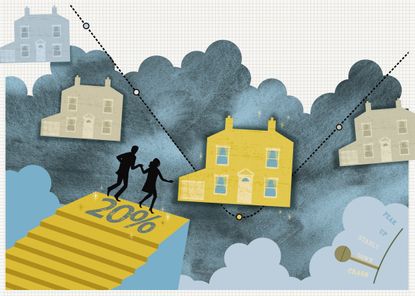The week's best financial advice
Three top pieces of financial advice — from murky tech investments to scrounging up a down payment

Here are three of the week's top pieces of financial advice, gathered from around the web:
Murky tech investments
Mutual funds "have been loading up" on shares of high-growth startups like Uber, Dropbox, and Airbnb, said Kirsten Grind at The Wall Street Journal. But with fears of a second tech bubble looming, the Securities and Exchange Commission is beginning to question money managers about how funds are valuing these hard-to-price holdings. Shares in private startups aren't traded publicly, so mutual fund firms must estimate what those shares are worth, frequently reporting different prices for the same company. Millions of investors are now exposed to these unpredictable startup shares, with Fidelity, T. Rowe Price, and BlackRock among the biggest money managers investing in private tech companies. The good news: Funds are only allowed to hold 15 percent of their assets in hard-to-sell securities, which include private-company shares.
Subscribe to The Week
Escape your echo chamber. Get the facts behind the news, plus analysis from multiple perspectives.

Sign up for The Week's Free Newsletters
From our morning news briefing to a weekly Good News Newsletter, get the best of The Week delivered directly to your inbox.
From our morning news briefing to a weekly Good News Newsletter, get the best of The Week delivered directly to your inbox.
Remixing portfolio rules
"Years ago, managing your investment portfolio was pretty simple," said Jeff Reeves at USA Today. Invest 60 percent in stocks, 40 percent in bonds, and rebalance once a year. But more and more, financial advisers believe the old 60/40 formula isn't just outdated, "but downright dangerous." Historically low interest rates have pulverized bond yields, and Americans' lengthening life spans demand more robust performance to fund a decades-long retirement. Advisers "differ greatly on what the proper mix is," but some suggest broadening the definition of "bonds" to include other income-producing investments, like dividend-paying stocks. In general, having more exposure to stocks, even in your 50s and 60s, increasingly looks like a smart move.
Scrounging up a down payment
"Home prices are on the rise, making it harder for buyers to cobble together a 20 percent down payment," Kathryn Vasel said at CNN. In order to secure the average four-bedroom, two-bathroom home — today worth $302,632 — buyers need to pony up $60,526, and that's before closing costs. But there are options for homebuyers without enough savings in the bank. The FHA backs mortgages that require as little as 3.5 percent down for borrowers with good credit. The Department of Veterans Affairs guarantees loans for former service members, and the Department of Agriculture has a loan program to aid home ownership in rural areas. If you borrow from a retirement account, "use caution to avoid paying penalties."
Create an account with the same email registered to your subscription to unlock access.
Sign up for Today's Best Articles in your inbox
A free daily email with the biggest news stories of the day – and the best features from TheWeek.com
-
 Ottawa climate talks: can global plastic problem be solved?
Ottawa climate talks: can global plastic problem be solved?In the spotlight Nations aim to draft world's first treaty on plastic pollution, but resistance from oil- and gas-producing countries could limit scope
By Harriet Marsden, The Week UK Published
-
 Netherlands split on WFH for sex workers
Netherlands split on WFH for sex workersSpeed Read Councils concerned over 'nuisance' of at-home sex work, but others say changes will curb underground sex trade
By Arion McNicoll, The Week UK Published
-
 'He adored Trump, and then rejected him'
'He adored Trump, and then rejected him'Today's Newspapers A roundup of the headlines from the US front pages
By The Week Staff Published
-
 The pros and cons of noncompete agreements
The pros and cons of noncompete agreementsThe Explainer The FTC wants to ban companies from binding their employees with noncompete agreements. Who would this benefit, and who would it hurt?
By Peter Weber Published
-
 What experts are saying about the economy's surprise contraction
What experts are saying about the economy's surprise contractionThe Explainer The sharpest opinions on the debate from around the web
By Brendan Morrow Published
-
 The death of cities was greatly exaggerated
The death of cities was greatly exaggeratedThe Explainer Why the pandemic predictions about urban flight were wrong
By David Faris Published
-
 The housing crisis is here
The housing crisis is hereThe Explainer As the pandemic takes its toll, renters face eviction even as buyers are bidding higher
By The Week Staff Published
-
 How to be an ally to marginalized coworkers
How to be an ally to marginalized coworkersThe Explainer Show up for your colleagues by showing that you see them and their struggles
By Tonya Russell Published
-
 What the stock market knows
What the stock market knowsThe Explainer Publicly traded companies are going to wallop small businesses
By Noah Millman Published
-
 Can the government save small businesses?
Can the government save small businesses?The Explainer Many are fighting for a fair share of the coronavirus rescue package
By The Week Staff Published
-
 How the oil crash could turn into a much bigger economic shock
How the oil crash could turn into a much bigger economic shockThe Explainer This could be a huge problem for the entire economy
By Jeff Spross Published